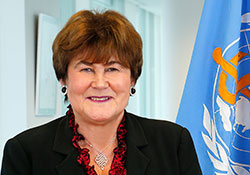Foreword 1

WHO/Franz Henriksen
by Zsuzsanna Jakab, WHO Regional Director for Europe
I am pleased to present the 2015 European health report, which is an essential resource for the 53 Member States in the WHO European Region, reporting on progress towards the Health 2020 targets. This report presents trends for the Health 2020 indicators and lessons learnt from individual countries on how they have taken effective public health action to improve the health and well-being of their populations. It also addresses the new public health challenges that have emerged in recent years. To respond effectively to these challenges, new forms of evidence are essential. This report gives an overview of the innovative work underway to improve the measurement and interpretation of health and well-being.
The European health report is a flagship publication that the WHO Regional Office for Europe issues every three years. The 2012 report set out the 2010 baseline measurements for monitoring progress towards the Health 2020 targets. The 2015 report presents the progress made since then. The targets encompass reducing premature mortality, increasing life expectancy, reducing inequities, enhancing well-being, ensuring universal health coverage and countries' setting national goals. An assessment of the available data across all these six targets reveals both positive developments and areas that need intensified public health action in the Region.
The 2012 European health report identified challenges in measuring and reporting on progress towards Health 2020, particularly in relation to measuring well-being. As a result of successful collaboration with other institutions and Member States, the WHO Regional Office for Europe is beginning to examine these challenges. The report presents an update on this work, along with proposals for new sources of qualitative evidence to describe and monitor wellbeing in relation to Health 2020. Facts and fi gures are not enough to report meaningfully on what it means to be healthy and well in Europe. Instead, this report argues, new forms of evidence are necessary to capture fully the experiences of health and well-being.
The Health 2020 monitoring framework, as adopted by Member States, is an important focus of this report. My team at the WHO Regional Office for Europe is working with countries to increase their capacity to monitor progress towards the Health 2020 targets. Nevertheless, comprehensive population health monitoring entails more than the indicators in the Health 2020 monitoring framework, which does not cover some important public health areas. Moreover, monitoring population health means more than analysing data and indicators; ensuring that health information is effectively used in the policy-making process is equally important. This report identifies key opportunities and challenges for making health information and evidence fit for the 21st century.
Primarily, the 2015 European health report shows progress at the regional level. I am confident, however, that it will also prove a useful information source for policy-makers, helping them identify areas that need further assessment and policy action at the national level. This publication should be of interest to all public health professionals, academic institutions, nongovernmental organizations and other groups keen to contribute to Health 2020 and to improving health and well-being in the European Region.
Broad international cooperation is required to efficiently and sustainably address the health information challenges facing the Region. Harmonization, cooperation and the sharing of knowledge, experiences and good practices are essential. I therefore hope that this book will inspire Member States and other stakeholders to join the European Health Information Initiative, a collaboration between the WHO Regional Office for Europe, European institutions and Member States to improve the information that underpins policy. Only by joining forces can the health information research and development agenda in our Region move forward in a productive and meaningful way.



